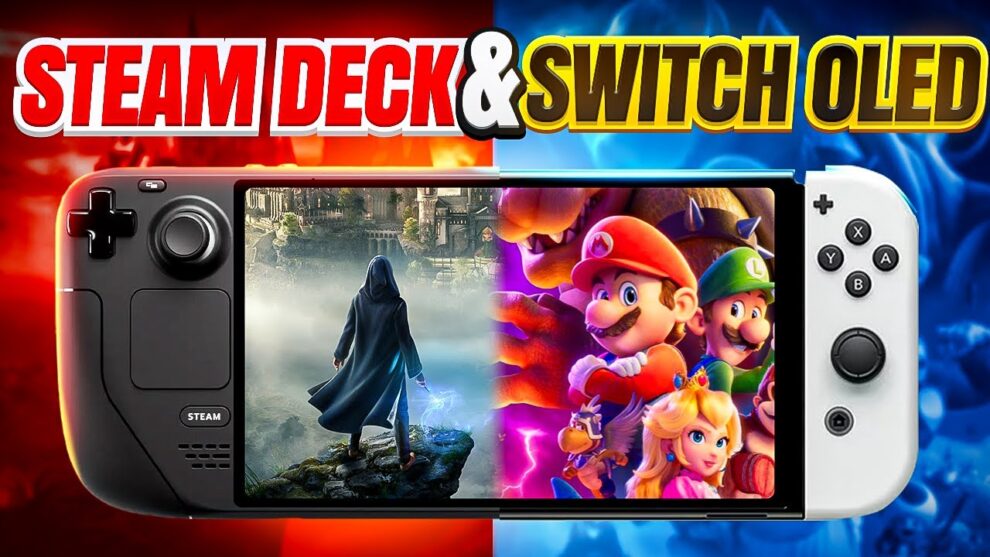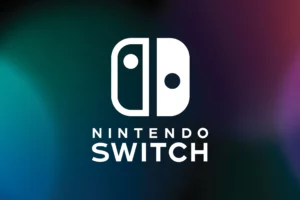With the release of Valve’s Steam Deck and the updated Nintendo Switch OLED model, portable gaming has never looked better. But which of these powerful handhelds is the right fit for you? We compare the Steam Deck and Switch OLED across key categories like performance, battery life, game library, price, and more to help you decide.
Performance
When it comes to raw processing power, the Steam Deck absolutely trounces the Switch OLED. The Steam Deck packs a custom Zen 2-based AMD CPU with 4 cores and 8 threads alongside an 8 CU RDNA 2 AMD GPU. This hardware allows the Steam Deck to run the latest and greatest PC games at high settings and hit up to 60 FPS in many titles.

The Switch OLED still utilizes Nvidia’s older Tegra X1+ chip, which is an iteration of the base X1 found in the original Switch. It can run Switch games at a steady 30 FPS and 1080p, but some demanding games cause framerate issues or lower resolutions. The Switch hardware simply can’t compare to the Steam Deck’s bleeding edge silicon.
Winner: Steam Deck
Battery Life
Battery life is a key consideration for any portable gaming platform. Unfortunately, neither the Steam Deck nor the Switch OLED really excel in this area due to their power-hungry components and high resolution screens.
Under strain, the Steam Deck averages between just 2-4 hours of playtime. Lighter 2D indie titles can squeeze out around 6 hours. However you spin it, you’re going to want to keep that charger handy.
The Switch OLED improves modestly over the original Switch with an estimated max battery life around 5-7 hours depending on the game. So the Switch OLED inches ahead of the Steam Deck here.
Winner: Nintendo Switch OLED
Game Library
Given Steam’s utterly massive catalog of games, from brand new releases to iconic classics, the Steam Deck provides access to far more titles than the Switch. Any game available on Steam you can install and play on the Steam Deck. You can even add non-Steam games and emulate older systems.

The Switch OLED can only play titles specifically developed for the platform. While the Switch enjoys strong first-party support from Nintendo and a solid selection of indies and ports, its game library pales in comparison to the Steam Deck. For players that value variety and options, the Steam Deck is the pick.
Winner: Steam Deck
Price
Available in three different storage configurations, the Steam Deck starts at $399 USD for the 64 GB model and ranges up to $649 USD for the 512 GB top-end version. Keep in mind you may need to purchase additional SD cards or drives to supplement the built-in capacity.
The Switch OLED comes in a single SKU priced at $349 USD with 64 GB of onboard storage. So if budget is a concern, the Switch OLED wins out with more built-in storage for less money upfront. Down the road, though, expect to pay more for Switch games and accessories versus Steam sales.
Winner: Nintendo Switch OLED
Portability
Make no mistake, neither of these machines can be called pocket sized. But when comparing true on-the-go portability, the Switch OLED maintains a slight edge.
Weighing approximately 1.47 pounds to the Steam Deck’s 1.93 pound bulk, and measuring just 9.5 x 4 x 0.55 inches inches versus the Steam Deck’s 11.7 x 4.6 x 1.9 inches frame, the Switch OLED puts up smaller dimensions all around. Factor in a sleeker, slimmer design, and the Switch OLED squeaks ahead as the more portable solution.
Winner: Nintendo Switch OLED
Who Should Buy the Steam Deck?
Thanks to its vastly superior performance, access to AAA games, and massive Steam library, the Steam Deck clearly caters to die-hard PC gamers who want desktop-like power in a handheld form factor. If you dream of playing Elden Ring on the bus or while lounging in bed, the Steam Deck makes it happen.
Hardware tinkerers will also relish customizing and optimizing the SteamOS software to enable new capabilities. And with full access to PC settings and components like SSDs, there’s plenty there under the hood to tweak to your liking.
Who Should Buy the Nintendo Switch OLED?
For Nintendo fans eager to enjoy the House of Mario’s famous franchises on the go, the Switch OLED offers the ultimate on-the-go experience. Between family-friendly Nintendo exclusives, a thriving indie scene, and the ability to play your Switch on the big screen, the Switch OLED brings superb versatility.
The more compact size and lighter weight also make the Switch OLED a great travel companion you can pop in any bag or play comfortably in cramped spaces like planes and cars. If you plan to game socially with local multiplayer titles, the Switch OLED serves up seamless fun.
The Bottom Line
The Steam Deck reigns as an unrivaled portable gaming PC, while the Switch OLED remains the best way to play Nintendo classics anywhere. Both devices have their own strengths and target audience.
For maximum performance, the Steam Deck has raw power and library depth no handheld can currently match. If you crave PC quality immersion untethered from your desktop, the Steam Deck should be your first choice.
As a pure gaming device with unique multiplayer capabilities, exclusive Nintendo content, and ultra portability, the Switch OLED retains its appeal. And with a lower cost of entry compared to the Steam Deck, the Switch OLED offers incredible value.
So decide what matters most – power, portability, library, exclusives, pricing, or versatility. Let your personal preferences guide you toward the ideal portable gaming powerhouse.
















Add Comment